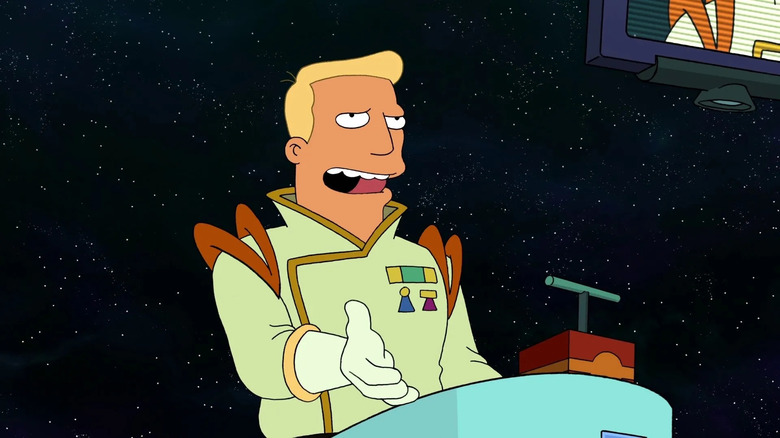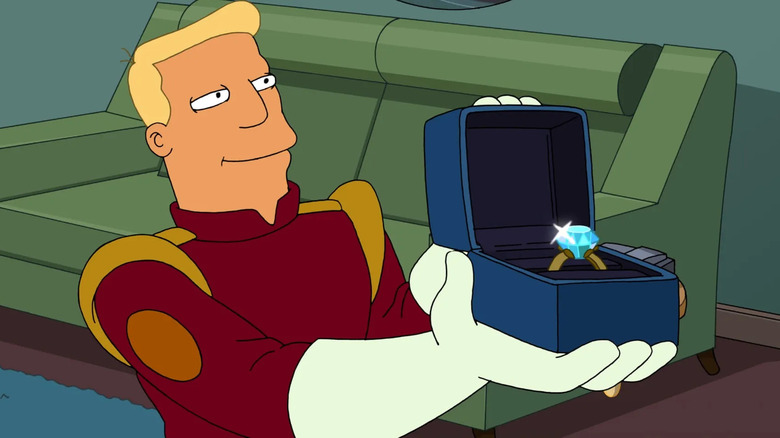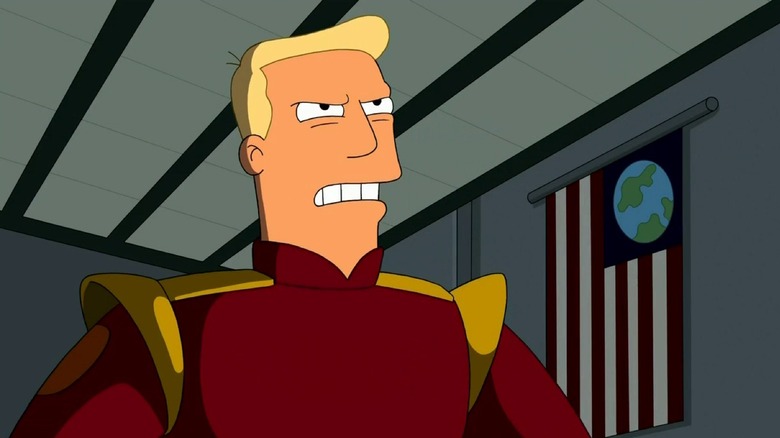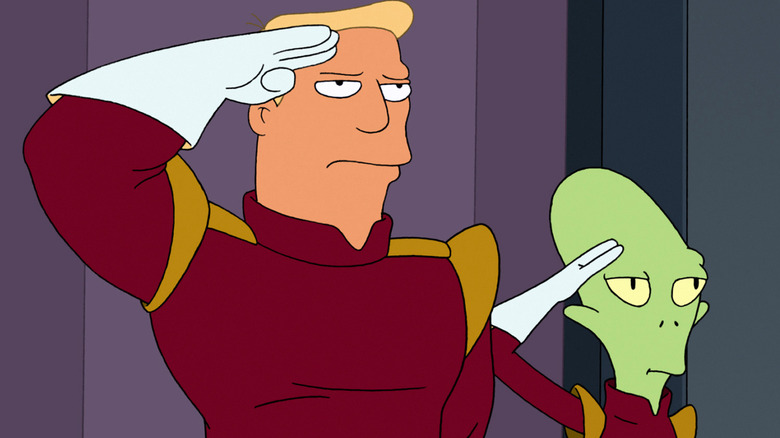Futurama Season 11 Smuggles Some Its Best Satire Yet Inside A Stilted Critique Of Cancel Culture
Of all the rude, crass, self-absorbed, ridiculous, inappropriate criminals on "Futurama" – that is to say, most of the characters on the show — none is more worthy of censure than Captain Zapp Brannigan (Billy West). Zapp works for DOOP, an organization similar to the Federation from "Star Trek," but far more trigger-happy and willing to engage in resource theft. Zapp commands a massive warship called the Nimbus, although the craft is not half as big as Zapp's ego. Zapp is narcissistic, over-sexualized, vain, crude, uncaring, obsessed with velour, and endlessly abusive to his first officer Kif (Maurice LaMarche) whom he uses as a towel in the show's latest episode. West once said in an interview with Vanity Fair that Zapp Brannigan was what might have happened if William Shatner, the actor, was in charge of the starship Enterprise instead of Captain Kirk.
In the series' newest episode, "Zapp Gets Canceled," the character is finally taken to task for his years of abuse. Kif finally loses his cool and files a formal complaint. Zapp is taken before a DOOP tribunal wherein Kif lays out only a few of the captain's more egregious transgressions. Zapp, found guilty, is sentenced to Cancelation. He has to wear a large scarlet "C" on his chest and is forced to attend a sensitivity training workshop.
Fans of "Futurama" might sense that 31st-century sensitivity training won't provide much in the way of actual psychology or substance. Indeed, Zapp finds himself being openly abused by the training course's instructor Dr. Kind (John DiMaggio) as a presumed form of "taste of your own medicine" therapy.
The messages laid out by "Zapp Gets Canceled" are ultimately sardonic about Cancel Culture. Let's look at what it does poorly and what it does quite well.
Cancel Culture is a mere nuisance
The initial satire of Cancel Culture in "Zapp Gets Canceled" is perhaps the weakest part of the episode. Noted above, Zapp, when "canceled," has to wear a red letter "C" on his chest, a clear reference to Nathaniel Hawthorne's 1850 novel "The Scarlett Letter." As one might remember from their high school literature classes, the character of Hester Prynne, living in a puritanical society in 17th century New England, gives birth to a child ... out of wedlock. The scandal leads her community to ostracize her, forcing her to wear a scarlet "A" on her chest — for "adultery" — for the rest of her life. For the reader, the "A" is a symbol of the repressive society around Hester, a totem of the way women are regularly humiliated.
As such, the scarlet "C" on Zapp's chest carries with it a distant whiff of a rather tiresome criticism of cancel culture. It's as if the makers of "Futurama" feel that "being canceled" is the result of irrational mob mentality and not an attempt to apply modern, cyberspace-inflected frontier justice to a criminal or a bully who has not been duly prosecuted by the nation's legal system. There are valid criticisms of "cancel culture," of course. It can, for instance, be reverse-weaponized by actual bullies to quickly and viciously over-target people whose censure will prove nothing; see: Lindsay Ellis. But those who typically complain about cancel culture are typically comedians who feel dismayed by their inability to continue to make blunt, hackneyed, and offensive jokes in an evolving society.
The writers of "Zapp Gets Canceled" seem to imply that Zapp, while certainly deserving of punishment, is somehow being victimized by a strict organization that's forcing him into unneeded training. That part is clumsy.
No means no
In "Zapp Gets Canceled," after Captain Brannigan is forced out of his job and into sensitivity training, Leela is allowed to take his job as the commander of the Numbus. Naturally, she takes along Fry as her first officer. Her first mission is to a distant alien world called Tactilia, where she will make first contact with a species of fleshy, pastel-colored aliens. The aliens power their world from a single massive blowhole that constantly spews air and provides them with a seemingly bottomless supply of renewable energy. Weirdly, the Tactilians commune by growing extra hands and groping their brethren, something Fry and Leela are most certainly uncomfortable with.
Fry and Leela, however, are asked to endure the groping by the DOOP ambassador (Tress MacNeille). Bender (DiMaggio) shouts out that "No means no," and Leela repeatedly expresses trepidation at the physicality of the Tactilians. While one might be able to see the sci-fi weirdness of that scenario, there is something of an unsavory element to Leela's discomfort. She is being asked to be more or less assaulted as a matter of diplomacy.
But then, that illustrates an element of the world of "Futurama" that strengthens the episode's satire. Namely: everything is corrupted.
In a plot twist, it will be revealed that Leela has been ordered not merely to make first contact, but to find a way to steal the Tactilian blowhole resource for DOOP. This is not a mission of benevolence but of conniving and theft. "Leela," the ambassador explains, "sometimes we coerce people with war, sometimes we take the high road and trick them with peace."
Corruption thrives in a corrupt world
The Leela story and the Zapp story will eventually intersect in an unexpected way, allowing Zapp to emerge as a hero.
Zapp is, after the episode's climax, restored to his old position, pretty much off the hook for his years of abusive, gauche behavior. Zapp learns nothing. DOOP even begins to note that Zapp's lack of sensitivity is a strength. DOOP noted that "with PC culture," you get nothing but "weak captains too cowardly to shoot the helpless." Zapp, in being willing to be abusive and vulgar and an egomaniac, provides DOOP with all its power.
But then, you can see the joke, right? Zapp's lack of growth — and DOOP's general wickedness as an organization — is the central punchline of the episode. The universe of "Futurama," fans will be able to tell you, is just as petty, nonsensical, and shallow as the present, if not more so. DOOP is a corrupt organization that feints in the direction of sensitivity, but really just handles a form of organized military plunder. As much as audiences in 2023 would like to see Zapp be punished, he clearly lives in a world where his horrid behavior is a benefit. Zapp is kind of evil, but then, so is the world he lives in. Corruption begets the corrupt and protects the corrupted. It's only gentleness, personal comfort, and honesty that will be censured here.
So the satire of cancel culture in "Zapp Gets Canceled" is ultimately deeply cynical. We cannot rid the world of corrupt people if there are corrupt systems that allow them to thrive. Zapp Brannigan learns that he was right, and that being an ass is the best way to live. For "Futurama," that's darkly fitting.



